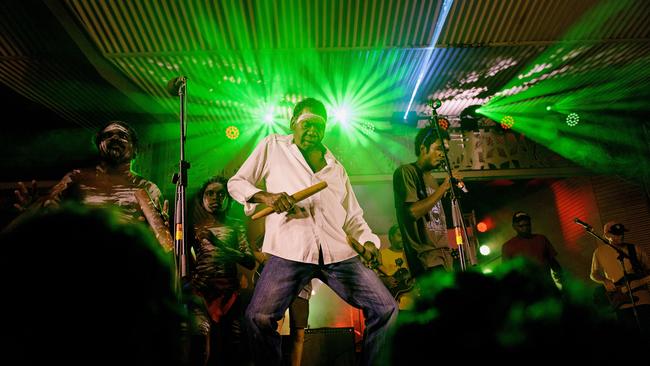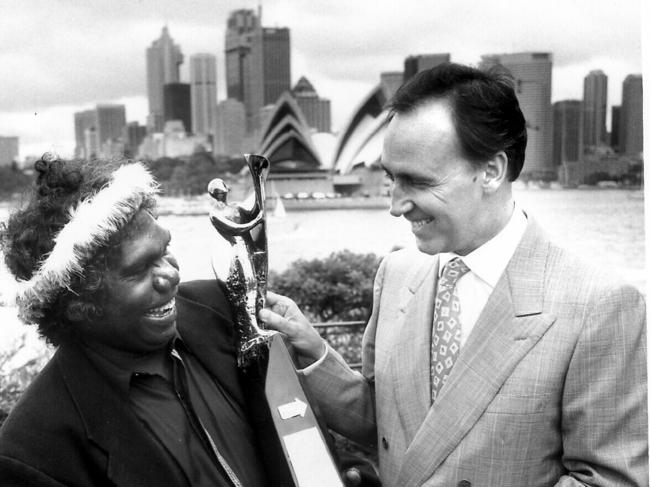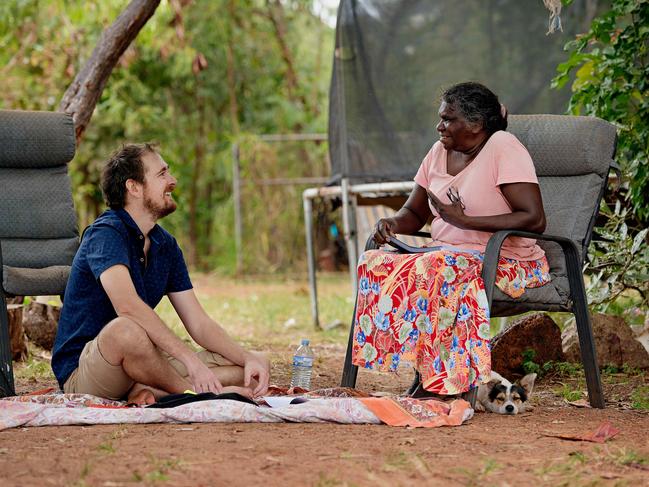30 years on from Treaty, Yothu Yindi renewed
A new book traces the highs and lows of the cutting-edge band.

When Yothu Yindi’s biggest hit crashed into the ARIA charts in 1991, the Northern Territory band rode hard on the crest of a churning wave. Australia was entranced.
The remix of Treaty, the tune that, beneath a booty-shaking dance club beat, decried former prime minister Bob Hawke’s failure to strike an agreement between the Australian government and Australia’s Aboriginal people, cemented itself in the top 40 for 22 weeks. It took out the coveted song and single of the year ARIA awards at the music industry’s flagship night in 1992.
This band of Yolngu (Aboriginal people of East Arnhem Land) and balanda (non-Indigenous) men and women from the remote NT had cracked the mainstream.
Three decades since that remix dropped, Yothu Yindi dancer Mangatjay Yunupingu, with his chest-length hair and round John Lennon spectacles, sits over fried rice in a Darwin food court, peering back.
“I’ll tell you the real fact of what Yothu Yindi did. Yothu Yindi was, and is still, the eye-opener of the nation,” he says. “It opened eyes to look at Indigenous people; who they are, what they stand for and where they’re situated.”
In the wake of Treaty and its ensuing album Tribal Voice, Yothu Yindi’s charismatic and boundary-hopping lead singer, Mandawuy Yunupingu, was in demand across Australia; to the point where, on January 26, 1993, he was awarded the Australian of the Year trophy by prime minister Paul Keating. However, little more than a decade later, the towering wave had crashed.

By 2007 Dr Yunupingu was homeless, living in a tent on a beach in his East Arnhem community of Yirrkala, out and exposed to the elements. After years of alcohol dependence his health was ailing rapidly. His kidneys were giving out. And money was short; despite his success, the Yothu Yindi singer had scant savings to his name.
“It was not really good,” his widow, Yalmay Yunupingu, recalls in Writing in the Sand, a new authorised biography about the band, released next week by ABC Books for Treaty’s 30th anniversary. “It didn’t suit us in the position that he was in. We didn’t have our own house (in Yirrkala) to go back to. We couldn’t just go in and move people out.”
Houses in East Arnhem Land communities, many of them ageing concrete block homes, are often shared by extended family and friends – overcrowding that contributes to the many hardships faced by the Yolngu population daily, from food insecurity to chronic illness.
“One thing I didn’t do during that time, I didn’t go to the media,” says Yalmay, a respected educator and linguist in Yirrkala. “Because my mind was so blocked. I would’ve gone to the media for housing. I would’ve taken the media to the beach: ‘This is where we are, this is where we’re living. Under a tent. An Australian of the Year recipient, and look where he is.’ I would’ve said that. I just didn’t do that. It was later on that I thought about it.”
The Australian media and music industry that once lauded Dr Yunupingu (who was awarded an honorary doctorate for his services to music and education by Queensland University of Technology in 1998) on the nation’s most glittering stages were absent. The spotlight had shifted on to others. For three months, the husband and wife lived on the beach. For three months, the singer with a smile to stop traffic drifted further and further into frailty.
Just a year or so later, Dr Yunupingu, the globetrotting former school principal photographed through the years with Nelson Mandela, with Muhammad Ali, lived in near obscurity in Darwin’s backstreets, suffering from end stage kidney disease – an illness to which he sadly succumbed to 2013 – and was bound to a thrice weekly course of dialysis. Yothu Yindi was on indefinite hiatus.

So how had the band gone from the darling of the Australian music scene, with a Hollywood Records deal in the US, to this, its lowest ebb?
Yes, there was the alcohol excess. There were community crises (a spate of suicides connected to Yothu Yindi rocked the group in the late 2000s). The tyrannies of remoteness. But the band’s long-term former manager, Alan “AJ” James, believes the nation’s shifting political climate also played a part. “When we first got into the business, no Aboriginal band had ever made any inroads in a mainstream sense,” Mr James says in Writing in the Sand.
“And racism was institutionalised. People didn’t even think of it as racism. It’s a bit like that stuff that’s coming out now about Hey Hey It’s Saturday, and the jokes that they used to make to Kamahl and things like that. That was just so normalised that anybody who complained about it at the time was on the road to a hiding.
“But with Treaty, the amazing thing was we were playing in pubs and clubs all around Australia, with packed houses, and the audience going off. But within two or three years, it felt like there was a backlash to that. And I don’t remember the year, but when that became pointedly so was after John Howard became prime minister. And that normalised everyone to be able to go back to being good ole racists in Australia.”
Mr James, who played a key role during Yothu Yindi’s rise to prominence and proffered financial support during Dr Yunupingu’s illness, says he has spent years trying to come to terms with the twists in Yothu Yindi’s journey.
“(It) was very disappointing,” says Mr James, also a Labor stalwart. “When you’re on the wave of something, where you can feel actual significant change happening, and then you’re actually part of the backlash afterward. The only way I’ve been able to console myself through that over the years is to believe that we made some incremental change. Initially it was seismic, and then after it swung back, it was still a step forward.”
Time has proven, however, that Australia never truly forgot Yothu Yindi. In recent years this breakthrough band has made a triumphant return to the stage with a reinvigorated line-up, and breathed new fire into its 30-year-old hits.
Dancer Mangatjay Yunupingu still gets a kick out of seeing the crowds. “People are still recognising you on the street,” he says.
“That sort of touches a soft spot in my heart, when people recognise you after so long. They know. They’ve seen you since your hair was dark. And when they see your greyed hair, they say, ‘Wow, it’s you!’ Great man, it’s great.”
Although Yothu Yindi’s surviving members may be peppered with grey, their modern audiences are dotted with youthful faces – those of a new generation wanting to hear this voice from the bush, still calling for a more unified Australia.
Names and images of the deceased have been used with permission from family.




To join the conversation, please log in. Don't have an account? Register
Join the conversation, you are commenting as Logout